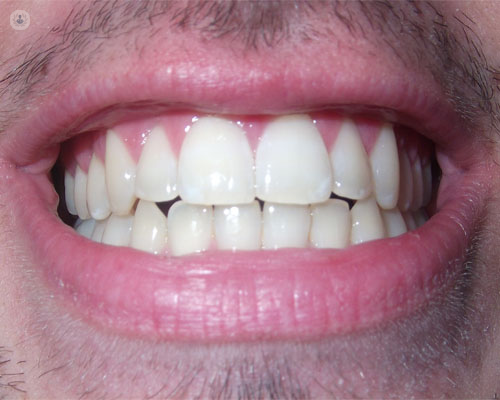

What is it?
Bruxism, more commonly known as teeth grinding, is when a person clenches or grinds their teeth. This can cause temporomandibular joint (TMJ) problems and wear and tear of the tooth surface. The condition affects between 10 and 20% of the population. It may happen during the day or throughout the night, although it is more common when sleeping when it is more difficult to control.

Prognosis
Teeth grinding isn’t dangerous, but it can lead onto other problems, such as permanent tooth damage, jaw or ear pain, headaches, or temporomandibular joint and muscles (TMJ) disorders.
It may cause other issues such as insomnia, depression, or eating disorders.
What are the symptoms?
Grinding or clenching teeth can put pressure on the oral structure: muscles, tissues, and jaw. This pressure translates into:
- anxiety, stress, and tension
- earache, as some temporomandibular joint structures are close to the outer ear canal. The pain may not be directly in the ear, it may be referred pain from a nearby area
- eating disorders
- headache
- muscle sensitivity, especially in the morning
- dental sensitivity when consuming hot, cold, or sweet foods
- insomnia
- jaw pain or swelling
These are general symptoms, although some people may grind and clench their teeth but show no symptoms. Things that can affect how long the clenching lasts include: patient stress levels, teeth not being aligned, posture, diet, and sleeping habits.
Tests for bruxism
Many people aren’t aware that they have bruxism and they normally find out when undergoing a routine dental check-up or due to face or neck pain. In some cases, a person is told that they have been heard grinding their teeth while sleeping.
Physical examinations and X-rays can confirm diagnosis.
An electromyogram (EMG) can check the intensity and frequency of bruxism during the day or night by evaluating the muscles used for chewing. A polysomnography can also be done to check brain and muscle activity during sleep.
What causes it?
Whether bruxism affects the person during the day or at night, it is an involuntary habit. There isn’t a known cause for bruxism although it is known that stress and anxiety may be a factor in some patients. Genetic factors and issues such as allergies have also been linked to teeth grinding. Tooth alterations such as malocclusion (bad bite), central nervous system mechanisms, and muscle problems have been known to trigger it.
How can it be prevented?
Reducing stress and anxiety levels are methods that can help reduce teeth grinding but cannot necessarily prevent it if there are other factors involved.
What is the treatment?
Treatment will always involve ensuring there is no damage to the teeth or muscles. Depending on the severity of the case and how much it may affect the teeth, different treatments will be suggested:
- Relaxation: For some people, learning relaxation techniques and changing daily habits is enough. Massaging the face, head and neck in particular can help to relax the muscles.
- Occlusal or discharge splint: This is a resin or plastic dental protector that is used in severe cases. It treats the symptoms but not the cause in order to prevent tooth damage. It stops jaw, head, and ear pain from when it is used. The patient can wear it during the day, at night, or both, depending on the intensity of the bruxism and what the specialist recommends. It should be noted that occlusal splints do not get rid of bruxism.
As well as treatments, advice is often given, including:
- apply ice or damp heat to jaw muscles.
- avoid hard foods such as nuts.
- avoid chewing gum.
- drink plenty of water.
- get about 6-8 hours of sleep a day
- try to find ways to reduce sources of daily stress.
What specialist should I see?
Teeth grinding or bruxism can be treated by a maxillofacial surgeon or a dental specialist.
